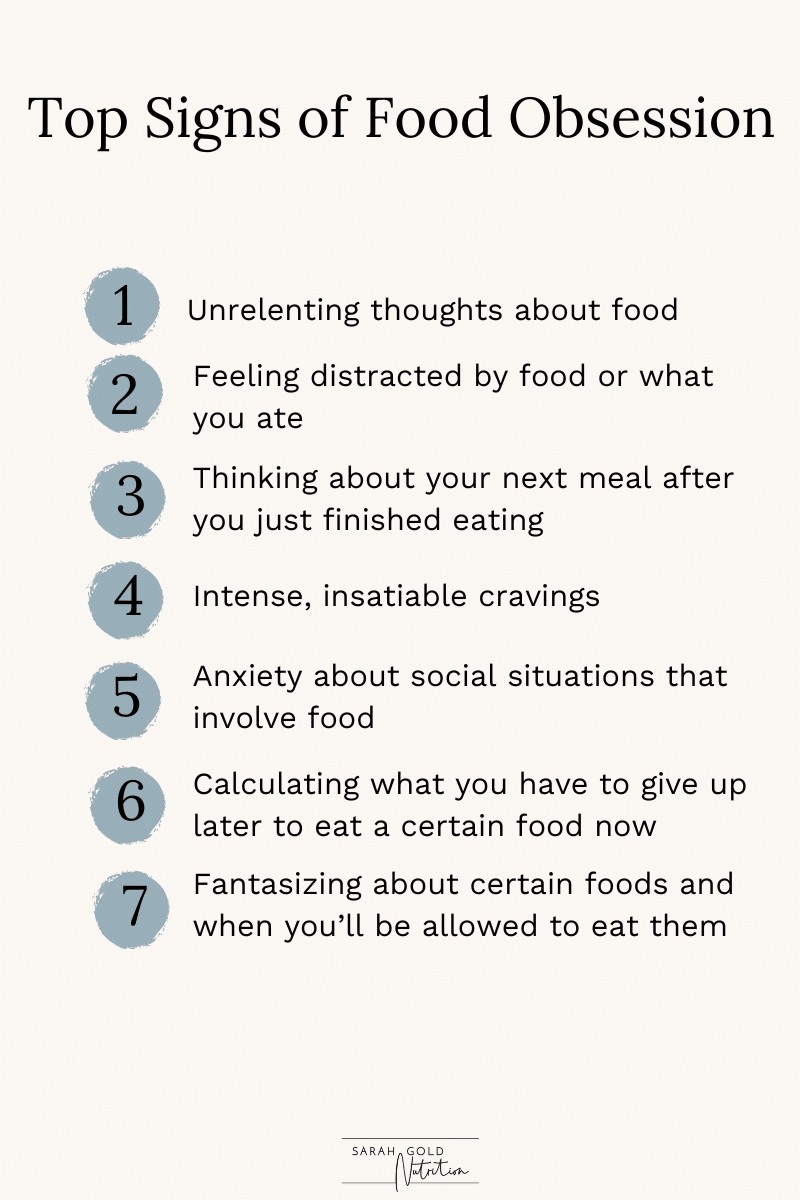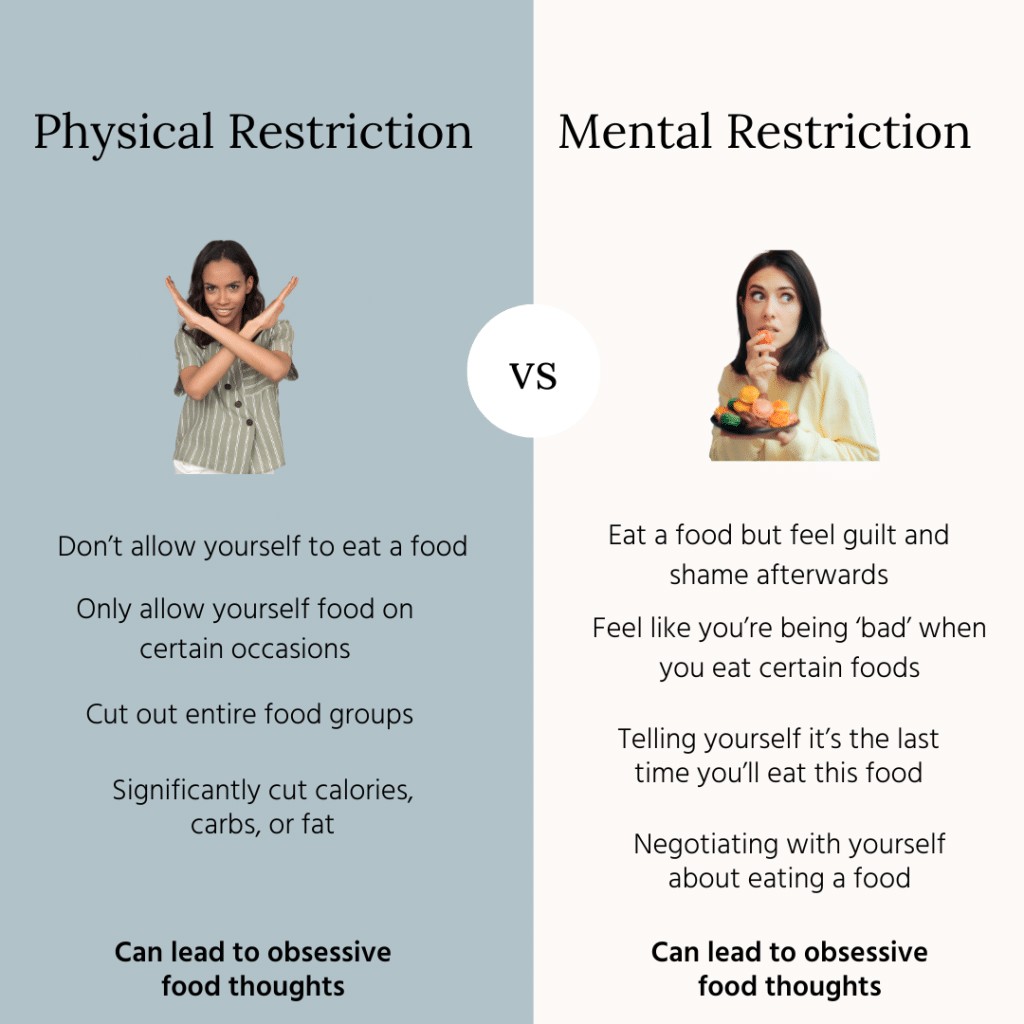Are you constantly preoccupied with food, feeling trapped in a never-ending mental loop of what, when, and how much to eat? Foods.edu.vn understands this struggle and offers a pathway to liberation. Discover the underlying causes of your food obsession and learn actionable steps to break free, reclaiming your life from the grip of constant food-related thoughts with mindful eating, balanced diets and nutrition guide.
1. What Exactly Is Food Obsession?
Food obsession is characterized by thoughts dominated by food and eating habits.
It often manifests as a continuous internal dialogue—calculating daily calorie consumption, negotiating meal times, fixating on future meals even after just eating, or fluctuating between happiness, guilt, or shame related to dietary choices. This preoccupation can be overwhelming, but understanding its signs is the first step toward overcoming it.
1.1. Common Signs Of Food Obsession:
- Fixation: Constant, intrusive thoughts about specific foods.
- Meal Planning: Regularly anticipating the next eating opportunity.
- Post-Meal Thoughts: Thinking about your next meal immediately after finishing one.
- Daydreaming: Fantasizing about eating certain foods.
- Distraction: Feeling mentally preoccupied by food or past meals.
- Calorie Calculation: Determining what you must sacrifice to enjoy a particular food.
- Meticulous Meal Planning: Rigorously planning every meal and snack.
- Intense Cravings: Experiencing powerful, insatiable desires for specific foods.
- Food Media Consumption: Spending hours viewing recipes, reading food blogs, or watching culinary shows.
- Calorie Saving: Intentionally reducing calorie intake in anticipation of future meals.
- Social Anxiety: Feeling anxious in social situations involving food, such as celebrations or vacations.
- Exercise Planning: Organizing workouts around meals to neutralize calorie intake.
- Nutrient Tracking: Monitoring calories, macros, or dietary points meticulously.
- Advance Menu Planning: Reviewing menus weeks in advance and pre-selecting meals.
- Label Scrutiny: Intensively scrutinizing food labels and worrying about certain ingredients or nutritional information.
Many of these behaviors are normalized by diet culture. But these habits create an unhealthy obsession with food.
Alt Text: Seven common signs of food obsession including preoccupation with calories, ingredients, and meal planning.
2. What Are The Top 3 Reasons Behind Your Obsession With Food?
Frequent thoughts about food often indicate a dietary mindset, even without actively dieting. This can stem from ingrained food rules from previous diets or beliefs gathered from various sources.
2.1. You’re Not Eating Enough
Constant thoughts about food can be a sign of hunger. Your body is signaling its need for more energy, causing your brain to focus on food. Ignoring these hunger cues and restricting calories can lead to overeating later, as your body tries to protect itself from perceived starvation, fueling food obsession and feelings of guilt.
The Minnesota Starvation Experiment vividly illustrates the effects of undereating on food obsession. In this study, healthy men on a restricted diet of 1700 calories per day—more than many modern diets allow—began to exhibit food obsession within weeks. They became fixated on food images, manipulated rations to appear larger, and exercised to earn more calories. These behaviors persisted for months after the study.
This underscores that hunger drives obsession, and severe calorie restriction can have long-lasting effects on one’s mindset around food.
2.2. You’re Restricting Certain Foods
Banning certain foods, like carbs or sugary snacks, can make them more appealing.
This is known as the “forbidden fruit phenomenon,” where the unavailability of certain foods increases cravings and focus on them.
Research supports this. In one study, children who were forbidden from eating red M&Ms showed a higher desire for them compared to those who could eat any color. Similarly, children whose parents restricted sweets at home consumed more candy overall.
Restricting specific foods can backfire, leading to cycles of restriction and overeating.
2.3. You’re Mentally Restricting
Mental restriction involves guilt and shame after eating, often due to beliefs that the food is “bad” or will cause weight gain.
This internal conflict results from years of dieting or exposure to negative messages about certain foods, leading to obsessive thoughts post-meal. It’s not a personal failing but a biological response shaped by human nature.
Alt Text: Comparison of physical restriction where food is avoided and mental restriction where food is eaten but with guilt.
3. 3 Practical Steps To End Food Obsession
Ending food obsession is achievable by understanding your body’s needs, making peace with food, and reintroducing restricted foods.
3.1. Start Honoring Your Hunger And Eating Enough
Listening to your body’s hunger signals is crucial. If you’ve been restricting calories, this may be challenging. Start slowly, using the Intuitive Eating Hunger-Fullness Scale to reconnect with your hunger and fullness cues. Eating enjoyable and satisfying foods is also vital, as including foods that make you happy can reduce post-meal food thoughts.
3.2. Work On Making Peace With Food
If you label foods as “good” or “bad” or feel guilty after eating certain foods, it’s time to change those beliefs. Begin by identifying and dismantling the food rules and beliefs that hold you back. Ask yourself where these rules come from and whether they still serve you.
3.3. Practice Food Habituation
Once you’re eating enough and have worked through your food rules, begin food habituation. This involves strategically reintroducing restricted foods to reduce their power over you, ending feelings of deprivation that lead to overeating, emotional eating, and guilt. This helps normalize foods and eliminate obsessive thoughts.
Working with a certified intuitive eating counselor can provide support during this process.
4. Search Intent To The “Why Am I Obsessed With Food”
Understanding the search intent behind “Why Am I Obsessed With Food” is crucial to crafting content that truly resonates with users. Here are five key search intents:
-
Information Seeking: Users want to understand the underlying reasons for their food obsession. They seek explanations about the psychological, physiological, and environmental factors contributing to their preoccupation with food.
-
Symptom Identification: Individuals are looking for a list of signs and symptoms to confirm whether their thoughts and behaviors around food qualify as an obsession. They want to compare their experiences with established criteria.
-
Solution Discovery: Users are actively seeking practical strategies and steps to overcome their food obsession. They want actionable advice on how to change their mindset, behaviors, and relationship with food.
-
Resource Exploration: People are interested in finding additional resources such as books, articles, support groups, or professionals who can provide further guidance and assistance in their journey to overcoming food obsession.
-
Community Engagement: Users are looking for a sense of community and connection with others who share similar experiences. They want to find forums, social media groups, or online communities where they can share their stories, seek support, and learn from others.
5. Let’s Talk About Disordered Eating
Disordered eating includes a variety of irregular eating behaviors that don’t meet the strict criteria for a full-blown eating disorder. These behaviors are often driven by an excessive focus on weight, body shape, and dieting. Understanding disordered eating is important because it can significantly impact a person’s physical and mental health, and it can also be a precursor to developing a more serious eating disorder.
5.1. Common Behaviors Associated with Disordered Eating
-
Restrictive Dieting: This involves severely limiting the amount or types of food consumed in an attempt to lose weight or maintain a certain body shape. Restrictive dieting can lead to nutritional deficiencies, fatigue, and an increased risk of binge eating.
-
Binge Eating: Binge eating is characterized by episodes of consuming large amounts of food in a short period, accompanied by a sense of loss of control. Binge eating can lead to feelings of guilt, shame, and weight gain.
-
Compulsive Exercise: This involves excessive and rigid exercise routines that are driven by a need to burn calories or control weight. Compulsive exercise can lead to injuries, exhaustion, and negative impacts on mental health.
-
Emotional Eating: Emotional eating involves using food as a coping mechanism for dealing with emotions such as stress, sadness, or boredom. Emotional eating can lead to weight gain and a cycle of emotional distress.
-
Food Obsession: Food obsession involves an excessive preoccupation with food, calories, and dieting. Food obsession can lead to anxiety, stress, and a decreased quality of life.
-
Body Image Issues: Negative body image involves dissatisfaction with one’s appearance and a preoccupation with perceived flaws. Body image issues can lead to low self-esteem, anxiety, and depression.
5.2. Health Consequences of Disordered Eating
Disordered eating can have a wide range of negative impacts on both physical and mental health.
-
Nutritional Deficiencies: Restrictive dieting and other disordered eating behaviors can lead to deficiencies in essential nutrients, which can impair bodily functions and increase the risk of chronic diseases.
-
Weight Fluctuations: Disordered eating can lead to significant weight fluctuations, which can strain the body and increase the risk of metabolic problems.
-
Gastrointestinal Issues: Disordered eating can disrupt normal digestive processes, leading to gastrointestinal problems such as bloating, constipation, and irritable bowel syndrome (IBS).
-
Cardiovascular Problems: Disordered eating can increase the risk of cardiovascular problems such as high blood pressure, high cholesterol, and heart disease.
-
Mental Health Problems: Disordered eating is often associated with mental health problems such as anxiety, depression, and obsessive-compulsive disorder (OCD).
5.3. Differentiating Between Disordered Eating and Eating Disorders
While disordered eating and eating disorders share some common characteristics, there are important distinctions between the two. Eating disorders are formally recognized psychiatric conditions with specific diagnostic criteria, while disordered eating encompasses a broader range of irregular eating behaviors that don’t meet the full criteria for an eating disorder. Eating disorders typically involve more severe and persistent disturbances in eating behaviors and body image, and they often require professional treatment.
| Feature | Disordered Eating | Eating Disorder |
|---|---|---|
| Diagnostic Criteria | Does not meet full diagnostic criteria for an eating disorder | Meets specific diagnostic criteria outlined in the DSM-5 |
| Severity | Less severe and persistent disturbances in eating behaviors | More severe and persistent disturbances in eating behaviors and body image |
| Impact on Functioning | May have some impact on daily life and functioning | Significant impact on daily life, functioning, and overall well-being |
| Treatment | May benefit from lifestyle changes, therapy, or nutritional counseling | Typically requires professional treatment, including therapy, medication, and nutritional rehabilitation |


5.4. How to Get Help
If you’re struggling with disordered eating or an eating disorder, it’s important to seek professional help. A variety of treatment options are available, including therapy, nutritional counseling, and medical management.
- Therapy: Cognitive-behavioral therapy (CBT) and other forms of therapy can help you identify and change negative thoughts and behaviors related to food and body image.
- Nutritional Counseling: A registered dietitian can help you develop a healthy eating plan and address any nutritional deficiencies.
- Medical Management: A medical doctor can monitor your physical health and address any medical complications related to disordered eating.
6. How to Deal with Food Obsession
Dealing with food obsession requires a multifaceted approach that addresses both the physical and psychological aspects of the issue. Here are some strategies to help you regain control over your thoughts and behaviors around food:
-
Identify Triggers: Start by identifying the triggers that lead to your food obsession. These triggers can be emotional, environmental, or behavioral. For example, stress, boredom, social situations, or exposure to certain foods or images can all trigger food obsession.
-
Challenge Negative Thoughts: Challenge the negative thoughts and beliefs that fuel your food obsession. Ask yourself whether these thoughts are based on facts or emotions.
-
Practice Mindful Eating: Mindful eating involves paying attention to your hunger and fullness cues, and savoring each bite of food.
-
Seek Professional Help: If you’re struggling to overcome food obsession on your own, consider seeking professional help from a therapist, registered dietitian, or eating disorder specialist. These professionals can provide you with support, guidance, and evidence-based strategies for overcoming food obsession.
7. FAQ: Addressing Your Questions About Food Obsession
Here are some frequently asked questions related to food obsession, providing clear and concise answers to help you better understand and manage this challenging issue.
-
Q: What does it mean to be obsessed with food?
A: Food obsession involves a constant preoccupation with food, including thoughts about what to eat, when to eat, and how much to eat.
-
Q: Is it normal to think about food all the time?
A: It’s normal to think about food regularly, but excessive and intrusive thoughts that interfere with daily life may indicate food obsession.
-
Q: What causes food obsession?
A: Food obsession can be caused by various factors, including restrictive dieting, emotional eating, stress, and underlying psychological issues.
-
Q: How do I know if I have a food obsession?
A: Signs of food obsession include constant thoughts about food, feeling guilty after eating certain foods, and avoiding social situations involving food.
-
Q: What are the negative consequences of food obsession?
A: Food obsession can lead to various negative consequences, including anxiety, depression, social isolation, and unhealthy eating behaviors.
-
Q: How can I overcome food obsession?
A: Overcoming food obsession involves addressing the underlying causes, challenging negative thoughts, practicing mindful eating, and seeking professional help.
-
Q: Can therapy help with food obsession?
A: Yes, therapy, such as cognitive-behavioral therapy (CBT), can help you identify and change negative thoughts and behaviors related to food obsession.
-
Q: What role does a registered dietitian play in treating food obsession?
A: A registered dietitian can help you develop a healthy eating plan, address nutritional deficiencies, and learn to eat mindfully.
-
Q: Are there any medications that can help with food obsession?
A: In some cases, medications may be prescribed to address underlying psychological issues that contribute to food obsession, such as anxiety or depression.
-
Q: What are some self-help strategies for managing food obsession?
A: Self-help strategies for managing food obsession include identifying triggers, practicing self-compassion, engaging in enjoyable activities, and seeking support from friends and family.
8. FOODS.EDU.VN: Your Partner In Building A Better Relationship With Food
You’re not alone in feeling obsessed with food. Remember, these feelings are often amplified by societal pressures rather than a lack of willpower.
Moving away from obsession is possible. Obsessing over food often begins with restriction—whether it’s limiting calories, cutting out food groups, or adhering to rigid diet rules. The more you restrict, the more food can begin to dominate your thoughts. Gradually allowing yourself a wider variety of foods and leading with self-compassion can reduce your obsession with food.
Ready to end food obsession? Foods.edu.vn is here to help you navigate this journey with personalized guidance and support. Visit our website to explore a wealth of resources:
- Detailed Articles: Gain in-depth knowledge about various aspects of nutrition and mindful eating.
- Practical Tips: Implement actionable strategies to break free from food obsession.
- Community Support: Connect with others who share similar experiences.
At FOODS.EDU.VN, we provide the tools and knowledge you need to develop a balanced, joyful relationship with food. Don’t let food control your life any longer. Visit us today and start your journey to food freedom!
Contact us:
- Address: 1946 Campus Dr, Hyde Park, NY 12538, United States
- WhatsApp: +1 845-452-9600
- Website: foods.edu.vn
